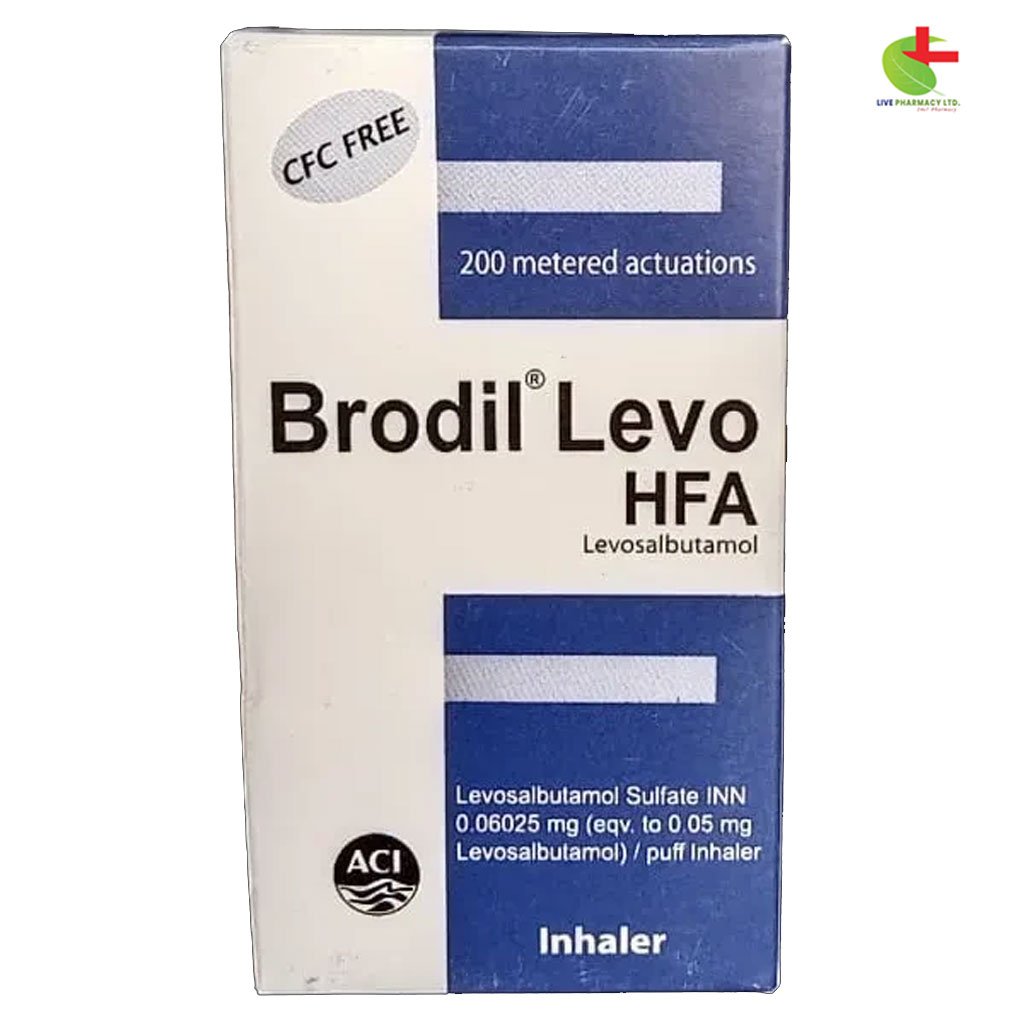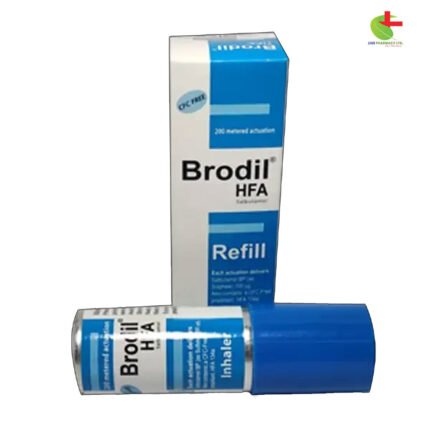Brodil Levo HFA
250.00৳ Inhaler
- Brodil Levo Nebuliser Solution or Inhaler is used for the treatment and prevention of bronchospasm in adults, adolescents, and children with reversible obstructive airway diseases like asthma.
- Contains Levosalbutamol, a selective β2 adrenergic receptor agonist that relaxes airway muscles.
- Available as a nebuliser solution for children (6 months-11 years) and adults (12 years and above) with specific dosages.
- Also used for asthma attacks, and for preventing exercise-induced or allergy-induced asthma when used with an inhaler.
 Brand
Brand
|
ACI Limited |
|---|---|
 Generics
Generics
|
Levosalbutamol |
 Type
Type
|
Metered-Dose Inhaler (MDI) |
Indications
Brodil Levo Nebulizer Solution or Inhaler is prescribed for the management and prevention of bronchospasm in adults, adolescents, and children suffering from reversible obstructive airway diseases such as asthma and chronic obstructive pulmonary disease (COPD).
Use only as directed by a registered healthcare professional.
Pharmacology
Levosalbutamol Nebulizer Solution is a clear, colorless, sterile, preservative-free formulation containing Levosalbutamol hydrochloride, the (R)-enantiomer of racemic salbutamol. It acts primarily as a selective β2 adrenergic receptor agonist.
When β2 receptors on airway smooth muscle are activated, adenylate cyclase is stimulated, increasing cyclic AMP (cAMP) levels. This, in turn, activates protein kinase A, which reduces intracellular calcium levels and inhibits myosin phosphorylation, leading to smooth muscle relaxation. Levosalbutamol relaxes the smooth muscles across all airways, from the trachea to the bronchioles. By acting as a functional antagonist, it counters bronchoconstriction caused by various spasmogens.
Dosage
Nebulizer Solution: Available in single-dose ampoules, this solution requires no dilution before nebulization.
- Children (6 months – 11 years): The recommended dose is 0.31 mg, administered three times daily. The total dose should not exceed 0.63 mg three times a day.
- Adults and Adolescents (12 years and older): Start with 0.63 mg, administered three to four times daily (every 6-8 hours) by nebulization.
- Patients with Severe Asthma (12 years and older): For patients with poorly controlled asthma, the dose can be increased to 1.25 mg three times daily for optimal relief.
Inhaler: Use as needed for asthma attacks at any time of day, with or without food. Take 1-2 puffs, up to 4 times daily, not exceeding 8 puffs within 24 hours. If you find yourself using the inhaler more than 3-4 times a week, it may indicate insufficient asthma control and a reassessment of your treatment plan. For prevention of exercise-induced or allergen-induced asthma, take 2 puffs 15 minutes prior to exposure or physical activity.
Follow your healthcare provider’s advice for proper usage.
Administration
To ensure effective use of the inhaler and maximize the medication’s delivery to the lungs, follow these steps (per “National Asthma Guidelines for Medical Practitioners”):
- Remove the cap from the inhaler.
- Shake the inhaler vigorously at least six times.
- If it’s your first time using the inhaler or it hasn’t been used for a week, release one puff into the air to check its functionality.
- Exhale fully, then hold the inhaler upright.
- Place the mouthpiece between your teeth and seal your lips around it.
- Inhale slowly and deeply through your mouth while pressing down firmly on the canister to release the medication.
- Remove the inhaler and hold your breath for at least 10 seconds.
- If more than one puff is prescribed, wait 1 minute between puffs, shaking the inhaler before each dose.
- After use, replace the cap. Rinse your mouth with water.
- Check your technique in front of a mirror to ensure proper inhalation. If you see a white mist during inhalation, your technique may need adjustment.
Inhaler Cleaning Instructions: Clean the inhaler once a week by removing the canister and rinsing the plastic actuator and cap with warm water (avoid submerging the metal canister). Dry thoroughly and reassemble carefully.
Use only as directed by a healthcare professional.
Drug Interactions
Caution is required when using Brodil Levo with other short-acting sympathomimetic bronchodilators or epinephrine, as combined use may result in unwanted cardiovascular effects.
- Beta-blockers: These can diminish the effect of Levosalbutamol and may induce severe bronchospasm in asthma patients. Cardioselective beta-blockers might be considered under medical supervision in specific cases, such as after myocardial infarction.
- Diuretics: Non-potassium-sparing diuretics, when combined with Levosalbutamol, may exacerbate hypokalemia and ECG changes, especially if the beta-agonist dose is exceeded.
- Digoxin: Monitor digoxin levels closely when used with Levosalbutamol Nebulizer Solution or Inhaler.
- Monoamine Oxidase Inhibitors (MAOIs) or Tricyclic Antidepressants: Use Brodil Levo with caution in patients on these medications, especially within 2 weeks of discontinuation.
Side Effects
Potentially severe side effects may include hypokalemia, particularly when combined with hypoxia. Other common side effects include palpitations, tremors (especially in the hands), muscle cramps, dizziness, headache, nervousness, fatigue, and insomnia.
Pregnancy & Lactation
- Pregnancy: There are limited studies on the safety of Levosalbutamol during pregnancy. It should only be used if the potential benefit outweighs the risk to the fetus.
- Lactation: It is unclear whether Levosalbutamol passes into breast milk. Exercise caution when administering the medication to breastfeeding women.
Precautions & Warnings
Levosalbutamol should be used with caution in individuals with cardiovascular disorders, including hypertension, arrhythmias, or coronary insufficiency. It is also contraindicated in those with hyperthyroidism, diabetes, or a history of convulsive disorders. Brodil Levo must not be injected.
Overdose Effects
Overdosing on Levosalbutamol may lead to excessive beta-adrenergic stimulation symptoms, including those listed under side effects. Treatment involves discontinuing the medication and applying appropriate symptomatic management. In severe cases, a cardioselective beta-blocker may be used under medical supervision.
Therapeutic Class
Short-acting selective β2-adrenergic receptor stimulants
Storage Conditions
Store below 25°C. Keep away from direct light. Do not refrigerate.













Reviews
There are no reviews yet.